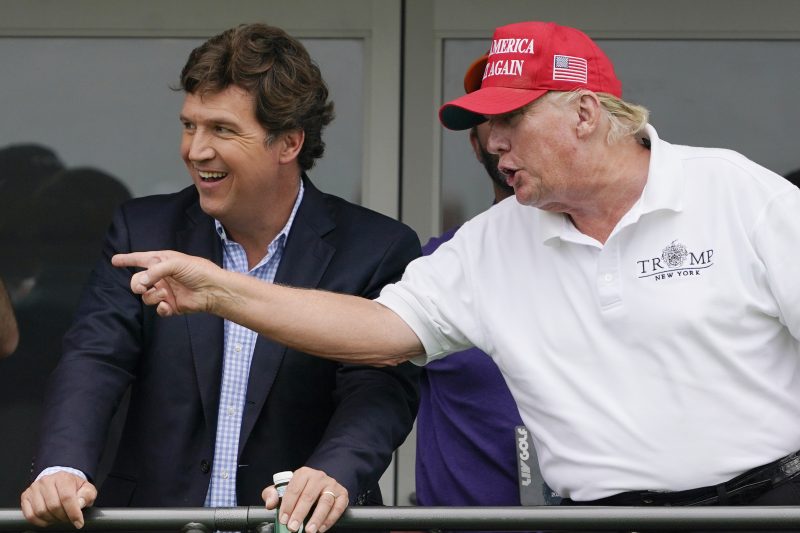It was as prescient and telling an exhibit as exists in Dominion Voting Systems’ defamation lawsuit against Fox News. After Sidney Powell’s and Rudy Giuliani’s infamous voter fraud conspiracy-laden news conference on Nov. 19, 2020, Fox host Dana Perino suggested on-air that Dominion might soon file a lawsuit.
“I wouldn’t be surprised if they decided to take some sort of action against this because, as you said, they have had these allegations out there smearing an American company,” Perino said.
But rather than lead to some soul-searching or even just some legally pragmatic thinking within Fox about its own decisions to entertain such theories, Fox News CEO Suzanne Scott took exception. She reacted to Perino’s commentary and other on-air talent who fact-checked such claims by saying: “You can’t give the crazies an inch right now. … They are looking for and blowing up all appearances of disrespect to the audience.”
Two years later, it’s Fox that has arguably paid the biggest price for the alleged defamation of Dominion and for stolen-election claims more broadly. While we don’t yet know whether Dominion’s suit against it will prevail, it has exposed Fox to a series of embarrassing disclosures by merely reaching the discovery phase.
But Fox is hardly alone. In fact, while the wheels of justice indeed turn slowly, the sanctions for those who baselessly spread and promoted such claims continue to increase.
Just this month, that list grew to include both a Trump campaign legal adviser and one of the most conspiratorial, Trump-backed candidates to appear on the 2022 ballot.
Trump legal adviser Jenna Ellis on Wednesday became the latest Trump lawyer to face sanction for her stolen-election claims. But what sets her case apart is that, as part of a deal in the Colorado Supreme Court in which Ellis was merely censured, she agreed that 10 specific statements she made were “misrepresentations.”
She apparently becomes the first Trump lawyer to directly concede that it was false to say the election was stolen, even though her former boss continues to say that to this day.
Ellis’s sanction came just days after another high-profile example: the penalizing of former Arizona secretary of state candidate Mark Finchem (R) and his lawyer by an Arizona judge for Finchem’s own stolen-election claims. The judge ruled that his effort to overturn his five-point loss in November was “groundless and not brought in good faith,” and she ordered the two to pay legal fees for Gov. Katie Hobbs (D) and Finchem’s 2022 opponent, now-Secretary of State Adrian Fontes (D).
The sanctions add to a growing list, which I recapped at the turn of the year:
In 2021, nine pro-Trump lawyers including Powell were ordered to pay a combined $175,000 in legal fees for filing a frivolous lawsuit in Michigan.A federal judge in Colorado disciplined two pro-Trump lawyers, calling their false claims “the stuff of which violent insurrections are made.” The $187,000 in fines in that case were upheld by an appeals court.In May, MyPillow CEO Mike Lindell was ordered to pay court costs over a lawsuit against voting-machine companies. A judge labeled the lawsuit “frivolous” and said it was based on some “groundless claims.”Rudy Giuliani, who was suspended from practicing law in Washington, D.C., in 2021, is facing potential disbarment.The Texas bar has also pushed to disbar Powell in ongoing legal proceedings. That effort was recently derailed over filing problems but could be resurrected.
Somewhat similarly to Ellis, Powell has effectively acknowledged that her claims weren’t all that she made them out to be, defending herself by suggesting she was merely acting as a legal advocate. Early in the Dominion case, she contended that “reasonable people would not accept” her statements — which included that she had proof of a stolen election — at face value. She later acknowledged that her claims were only “perhaps” true.
In addition to damaging Fox, the Dominion lawsuit has revealed high-ranking executives and hosts repeatedly sneering at how ridiculous the claims of the most high-profile election-deniers were, and at the viewers who believed them.
The 2022 elections proved particularly unkind to the most outspoken of the deniers. While many won thanks to favorable electorates, candidates like Finchem routinely lost and underperformed fellow Republicans when the electorates were competitive.
Perhaps because of that and perhaps because of the growing legal sanctions, the GOP’s stolen-election fever didn’t run as high after the 2022 elections — despite a series of disappointing results. Some like Tucker Carlson have broadly gestured at the idea that our elections continue to be suspect, but more mainstream conservative outlets like Fox are obviously less anxious than they were in late-2020 to air the claims of those such as failed Arizona GOP gubernatorial candidate Kari Lake.
The situation carries some parallels to Jan. 6, 2021. While plenty worried that we came this close to a constitutional crisis, the result was that ultimately — if belatedly — the system held strong. The false and baseless claims didn’t carry the day when all was said and done. Our democracy passed one of its most significant stress tests in history.
It’s too soon to say that’s also the case with election-denialism, especially since a strong majority of Republicans continue to believe the 2020 presidential election was stolen. Sanctions like those levied against Ellis, while symbolically significant, aren’t as serious as many critics had hoped. Trump is still driving the stolen-election train headlong into the 2024 GOP primaries. And Fox could prevail in the Dominion lawsuit, given the high bar for proving defamation against a media outlet.
But it’s also true that the costs of that quixotic crusade, reputational and otherwise, continue to accumulate in ways that will serve as cautionary tales for the would-be crusaders.

